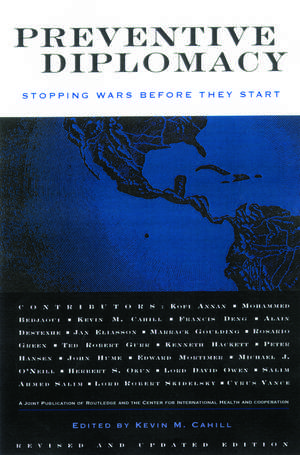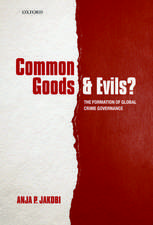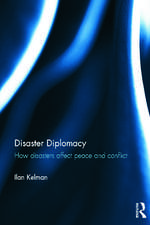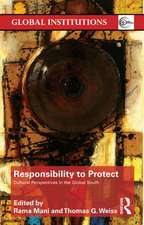Preventive Diplomacy: Stopping Wars Before They Start
Editat de Kevin M. Cahillen Limba Engleză Paperback – 19 sep 2000
| Toate formatele și edițiile | Preț | Express |
|---|---|---|
| Paperback (1) | 284.56 lei 6-8 săpt. | |
| Taylor & Francis – 19 sep 2000 | 284.56 lei 6-8 săpt. | |
| Hardback (1) | 704.74 lei 6-8 săpt. | |
| Taylor & Francis – 20 sep 2000 | 704.74 lei 6-8 săpt. |
Preț: 284.56 lei
Nou
Puncte Express: 427
Preț estimativ în valută:
54.45€ • 57.00$ • 45.05£
54.45€ • 57.00$ • 45.05£
Carte tipărită la comandă
Livrare economică 05-19 aprilie
Preluare comenzi: 021 569.72.76
Specificații
ISBN-13: 9780415922852
ISBN-10: 0415922852
Pagini: 354
Dimensiuni: 152 x 229 x 19 mm
Greutate: 0.45 kg
Ediția:Revizuită
Editura: Taylor & Francis
Colecția Routledge
Locul publicării:Oxford, United Kingdom
ISBN-10: 0415922852
Pagini: 354
Dimensiuni: 152 x 229 x 19 mm
Greutate: 0.45 kg
Ediția:Revizuită
Editura: Taylor & Francis
Colecția Routledge
Locul publicării:Oxford, United Kingdom
Notă biografică
Kevin M. Cahill is president and director of the Center for International Health and Cooperation in New York City. He also serves as director of the Tropical Disease Center at Lenox Hill Hospital and runs the joint degree program with CUNY for their International Diploma in Humanitarian Assistance. He is also the author of A Framework for Survival (1999) and the forthcoming Clearing the Fields.
Cuprins
Part 1 OLD CONCEPTS / NEW A PPROACHES; Chapter 1 A CLINICIAN'S CAUTION, Lord DavidOwen; Chapter 2 PEACE AND THE HEALING PROCESS, JohnHume; Chapter 3 THE FUNDAMENTALS OF PREVENTIVE DIPLOMACY, MohammedBedjaoui; Chapter 4 THE CHALLENGE OF HUMANITARIANISM, PeterHansen; Chapter 5 DEVELOPING PREVENTIVE JOURNALISM, Michael J.O'Neill; Part 2 P ARTICULAR P ROBLEMS IN PREVENTIVE D IPLOMACY; Chapter 6 WOMEN AS PartNERS FOR PEACE, RosarioGreen; Chapter 7 NEUTRALITY OR IMPartIALITY, AlainDestexhe; Chapter 8 CHANGING CONCEPTS OF DISPLACEMENT AND SOVEREIGNTY, FrancisDeng; Chapter 9 ECONOMIC SANCTIONS AS A MEANS TO INTERNATIONAL HEALTH, Lord Robert Skidelsky, EdwardMortimer; Part 3 M AJOR A CTORS; Chapter 10 CREATING HEALTHY ALLIANCES, CyrusVance, Herbert S.Okun; Chapter 11 THE PEACEKEEPING PRESCRIPTION, Kofi A.Annan; Chapter 12 REFLECTIONS ON THE ROLE OF THE UN AND ITS SECTRETARY-GENERAL, BoutrosBoutros-Ghali; Chapter 13 OBSERVATION, TRIAGE, AND INITIAL THERAPY, MarrackGoulding; Chapter 14 ESTABLISHING TRUST IN THE HEALER: PREVENTIVE DIPLOMACY AND THE F UTURE OF THE UNITED NATIONS, JanEliasson; Part 4 POTENTIAL PartICIPANTS IN PREVENTIVE DIPLOMACY; Chapter 15 EARLY-WARNING SYSTEMS: FROM SURVEILLANCE TO ASSESSMENT TO ACTION, Ted RobertGurr; Chapter 16 LOCALIZING OUTBREAKS, Salim AhmedSalim; Chapter 17 INTERNATIONAL NGOS IN PREVENTING CONFLICT, KennethHackett; Chapter 18 EMERGING INFECTIOUS DISEASE: THREATS TO GLOBAL S ECURITY, Scott R.Lillibridge; Conclusion; NOTES; ABOUT THE AUTHORS AND THE CIHC; INDEX;
Descriere
The suppression of war has been the primary objective of the United Nations for almost fifty years, and stopping a war before it starts is easier than ending a war already underway. History, however, has shown that military interventions and economic sanctions often do more harm than good. In <EM>Preventive Diplomacy</EM>, Nobel prize winners, top officials, and revered thinkers tackle these issues and explore the process of conflict prevention from humanitarian, economic, and political perspectives. This cross-disciplinary reader on global politics demonstrates that when new insights and methodologies on public health are applied to the handling of international disasters, the change in policy perspective is intriguing--even hopeful.











